#invasion of poland
Text
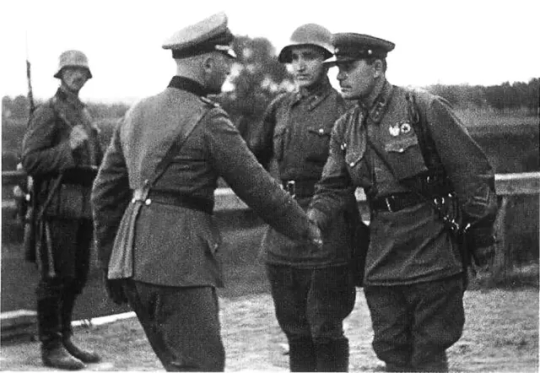
German and Soviet officers shake hands after the conclusion of the cooperative invasion of Poland, Oct 1939
20 notes
·
View notes
Text
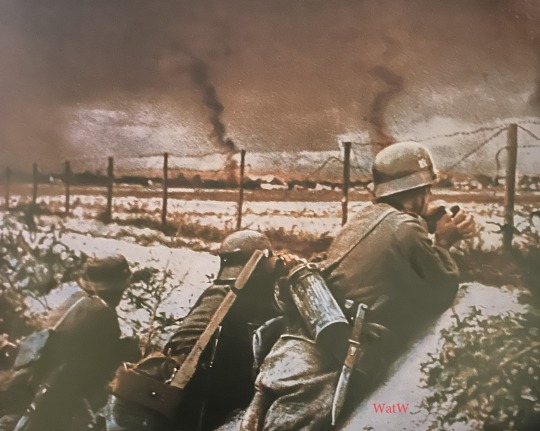
German troops watch the effects of artillery fire - Warsaw, Poland, 17th Sept 1939
#world war two#1940s#worldwar2photos#history#ww2#wwii#ww2 history#wwii era#world war 2#ww2history#wehrmacht#ww2colourphotos#Poland#Warsaw#sept 1939#1939#invasion of poland
90 notes
·
View notes
Text

Soldiers of the 1st SS-Leibstandarte Adolf Hitler Division, resting in a ditch alongside a road on the way to Pabianice, during the invasion of Poland in 1939
#germany#ww2#waffen ss#leibstandarte#leibstandarte adolf hitler#1939#invasion of poland#third reich#nazi germany
10 notes
·
View notes
Text
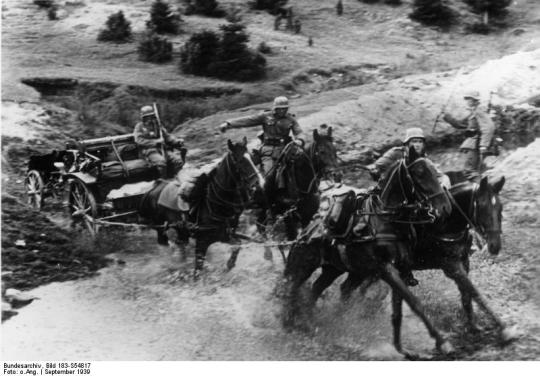
Traction hippomobile d'un canon d'infanterie 75 mm leIG 18 – Campagne de Pologne – Pologne – Septembre 1939
©Bundesarchiv - Bild 183-S54817
#WWII#campagne de pologne#polish campaign#invasion of poland#armée allemande#german army#heer#chevaux#horses#canon d'infanterie#infantry gun#75 mm leIG 18#7.5 cm leichtes Infanteriegeschütz 18#7.5 cm le.IG 18#pologne#poland#09/1939#1939
11 notes
·
View notes
Text
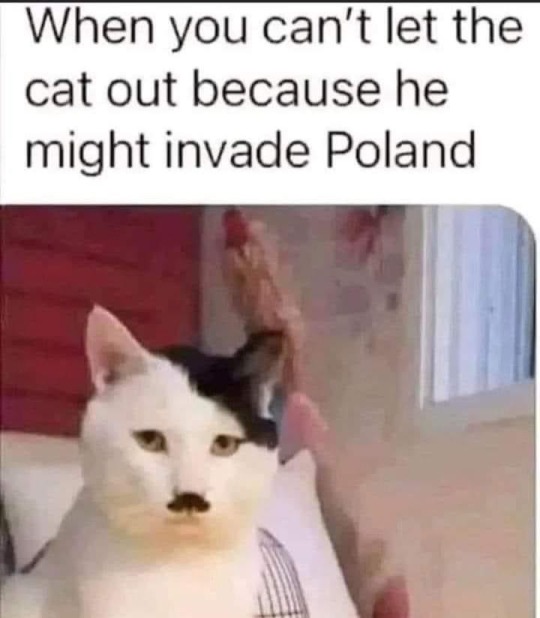
5 notes
·
View notes
Photo

So many lies in so few words....
The Russian government's various Twitter accounts are among the biggest liars on social media, and some of the biggest lies they re-tell almost every year relate to the Soviet Union's invasion of Poland in 1939. This really shouldn't be a surprise to anyone....
In February 2022, when Russia invaded Ukraine, the Kremlin's propagandists denied that Russia was doing anything of the kind while the invasion was actually happening, so lying about an invasion that took place a few decades ago must be a piece of cake in comparison. In Russia, it's a legal requirement to refer to the war against Ukraine as a "Special Military Operation" so maybe we should refer to Stalin dividing up Poland with Hitler in 1939 as a "Special Nazi Collaboration Operation". It's amazing to think that Russian citizens have been arrested, charged and convicted for telling the truth about both these events.
The above tweets were posted on 17th September 2021....
According to the first tweet, the USSR somehow "entered" Poland without actually invading - which is a crazy thing to say, given that two Red Army groups (consisting of 25 rifle divisions, 16 cavalry divisions and 12 tank brigades with a total of half a million men) stormed into Poland's sovereign territory in the early hours of 17th September 1939 in a simultaneous offensive that was launched along the entire length of Poland's border with the USSR, aiming to occupy the eastern half of the country. This was achieved after 19 days of fighting between the Red Army and the outnumbered and outgunned Polish army (which had already been fighting against the German invaders since 1st September). That sounds like an invasion to me....
It's also worth mentioning that the Soviets were breaking the following treaties and agreements when they invaded Poland:
1. The Peace Treaty between Poland, Russia and the Ukraine signed in Riga on 18th March 1921, in which the eastern frontier of Poland was defined.
2. The Protocol between Estonia, Latvia, Poland, Rumania and the USSR regarding renunciation of war as an instrument of national policy, signed in Moscow on 9th February 1929.
3. The Non-Aggression Treaty between Poland and the USSR signed in Moscow on 25th July 1932.
4. The Convention for the Definition of Aggression signed in London on 3rd July 1933, signed by Estonia, Latvia, Rumania, Turkey, Iran, Afghanistan and the USSR.
5. The Protocol signed in Moscow on 5th May 1934 between Poland and the USSR, extending until 31st December 1945, the Non-Aggression Treaty of July 25th 1932.
6. The agreement resulting from the notes exchanged in Moscow on 10th September 1934 between the Polish government and the Soviet government, in connection with the entry of the USSR into the League of Nations. This agreement emphasised that the relations between the countries would, in every respect, continue on the basis of all existing agreements between them, including the Treaty of Non-Aggression and the Convention for the Definition of Aggression.
7. The Covenant of the League of Nations, to which the USSR acceded on 17th September 1934.
8. The joint Communique issued in Moscow on 26th November 1938, by the Polish and Soviet governments, which confirmed that relations between them were, and would continue to be, based on all the existing agreements, including the Non-Aggression Treaty dated 25th July 1932, and extended on 5th May 1934.
TL;DR - Russia is lying as usual.
The next claim in the first tweet is that the Polish territory which the Soviet Union invaded and occupied in 1939 didn't really belong to Poland and had only been part of Poland since 1920.
But this is also a lie.
Back in the real world, much of what is now western Ukraine has been periodically incorporated into the Polish state ever since the beginning of the 11th century, at the time of the Kievan Rus. And the lands of present day Belarus and Ukraine were part of the Grand Duchy of Lithuania when it was united with Poland towards the end of the 14th century.
The entire territory of modern Belarus and most of Ukraine remained as part of the Polish-Lithuanian state until the end of the 18th century. Eastern Ukraine was ceded to Russia in the second half of the 17th century and Russia subsequently stole most of the territory of the Polish-Lithuanian state at the end of the 18th century when it conspired with Prussia and Austria to wipe Poland off the map (just like Hitler and Stalin did 150 years later). As well as most of the lands of present day Poland, Russia acquired all of what is now Belarus and more of Ukraine. The area of western Ukraine that was re-claimed by Poland after the First World War became part of Austria and was therefore never in Russia.
Today's Russian propagandists like to claim that Belarus, Ukraine and Russia have always been one nation, but the reality is that although all three had common origins in the Kievan Rus, they subsequently underwent hundreds of years of separate development before Belarus and Ukraine were incorporated into the Russian empire and subjected to prolonged periods of forced Russification. At the time of the Kievan Rus it's also the case that Kiev was dominant over Moscow and not vice versa....
Uprisings against Russian rule during the 19th century - notably in 1830 and 1863 - were supported by all parts of the former Polish-Lithuanian state and were savagely repressed by Russia.
In Belarus, a particularly brutal campaign of Russification was carried out after the second of these uprisings by the Governor General of Vilna, Mikhail Muravyov-Vilensky. One of the executed leaders of the uprising was a Belarusian called Kastuś Kalinoŭski, who is still regarded as a national hero by many Belarusians today. During the Russian invasion of Ukraine in 2022, Belarusian volunteers fighting on the Ukrainian side formed a battalion that was named in his honour, which later became a regiment.
In 1917, following the February revolution, the provisional government acknowledged the right of self-determination for the non-Russian nationalities in the Tsarist empire. When the Bolsheviks took over they renounced all Russia's territorial claims to Finland, Estonia, Latvia, Lithuania, most of Belarus, and Ukraine - and ceded these lands to Germany in the 1918 Treaty of Brest-Litovsk, when most of the territories in question were under German occupation. They were not, by any stretch of the imagination, part of Russia or the USSR at this point - just as there is nothing chiselled in stone to state that whoever rules in Moscow also gets to rule over Belarus and Ukraine.
As things turned out, a newly independent Poland and the newly formed Soviet state ended up dividing Belarus and Ukraine between them. The Treaty of Riga, which was signed in 1921 after the Polish-Soviet war, defined Poland's eastern border about half way between where the Polish-Russian border had been prior to the partitions of Poland and where it is today. Poland basically managed to reclaim some of what it had previously lost. The Soviets once again renounced their claims to all territory to the west of the new border, but nevertheless they invaded and occupied it two decades later in 1939.
TL;DR - Russia is lying as usual.
The first tweet also falsely claims that Poland was already defeated when the Soviet Union invaded and that the Polish government had already fled the country, despite the fact that Poland was far from defeated and the Polish government had not yet crossed the border into Romania. In any case, these lies ignore the rather pertinent fact that the invasion had already been pre-arranged with the Nazis, during and after the signing of the Molotov–Ribbentrop Pact of 23rd August 1939, which had defined the "spheres of influence" agreed by Nazi Germany and the Soviet Union, ie the territories that each of the signatories could invade without having to worry about retaliation from the other.....
How do we know this?
After the Second World War, the diplomatic communications between Nazi Germany and the Soviet Union that had been stored in the archives of the German Foreign Office were translated into English and published in a book called "Nazi-Soviet Relations 1939-41". The complete collection can now be found online HERE.
The records of the correspondence and meetings that took place between August and October 1939 clearly demonstrate how the two tyrannies planned and executed their mutual invasion of Poland. Documents like these are not only fascinating from a historical perspective, but also valuable in that they contradict some of the lies of the Kremlin's post-war propagandists (past and present) and their attempts to rewrite history by downplaying or denying the fact that the Nazis and Soviets were in bed together from August 1939 to June 1941. The archives clearly demonstrate how the Soviets cooperated, coordinated and collaborated with their Nazi allies over and over again during this period.
It's true that there was a gap of 16 days between the German invasion (1st September 1939) and the Soviet invasion (17th September 1939), but there were several reasons for the delay, for example:
1. The Soviet leader, Joseph Stalin, was still preoccupied with his undeclared war against Japan, which was only concluded on 15th September.
2. He also wanted to see if the British and French would fulfill their treaty obligations to Poland and attack Germany's undefended western frontier. French mobilisation had begun on 2nd September and their offensive should have started no later than the 17th.
3. It took time to mobilise the Red Army.
4. There were a few minor disagreements between the Soviets and the Nazis.
5. Stalin also had to invent an excuse - ie the propaganda that would justify the invasion of a peaceful neighbour by the world's only communist state, in alliance with a fascist state.
This is what actually happened in roughly chronological order....
Following the German invasion of Poland the Nazi foreign minister, Joachim von Ribbentrop, sent a telegram to the German Ambassador in Moscow which included the following request: "We definitely expect to have beaten the Polish Army decisively in a few weeks. We would then keep the area that was established as German sphere of interest at Moscow under military occupation. We would naturally, however, for military reasons, also have to proceed further against such Polish military forces as are at that time located in the Polish area belonging to the Russian sphere of interest. Please discuss this at once with Molotov and see if the Soviet Union does not consider it desirable for Russian forces to move at the proper time against Polish forces in the Russian sphere of interest and, for their part, to occupy this territory. In our estimation this would be not only a relief for us, but also, in the sense of the Moscow agreements, in the Soviet interest as well. In this connection please determine whether we may discuss this matter with the officers who have just arrived here and what the Soviet Government intends their position to be".
The Soviet foreign minister, Vyacheslav Molotov, responded with a telegram to the German ambassador on 5th September, which stated that: "....we agree with you that at a suitable time it will be absolutely necessary for us to start concrete action".
Soviet mobilisation began on 6th September.
On 9th September, Molotov sent a telegram to Ribbentrop, to inform him that Soviet military intervention "....would take place within the next few days".
On 10th September, the Soviet press was full of "in depth analysis" of the situation in Poland, stressing that German victory was imminent.
The Soviet ambassador left Poland on 11th September.
The next day the Soviet press launched a strident propaganda campaign of fake news about the treatment of the Belarusian and Ukrainian minorities in Poland (which was remarkably similar to the propaganda campaign of fake news the German press had launched about the treatment of the ethnic Germans living in Poland to justify the Nazi invasion), along with claims that the Polish army was scarcely fighting at all. And - of course - as the Polish state was disintegrating, it was imperative for the Red Army to prepare to rush to the aid of their Belarusian and Ukrainian "brothers" (this campaign also had more than a few things in common with the Kremlin’s campaign to justify Russia's 2022 invasion of Ukraine, in which it claimed to be defending "oppressed" ethnic Russians)....
On 14th September Molotov explained to the Germans that although the Red Army was ready to invade Poland, in order to justify the invasion politically: "....it was of the greatest importance not to take action until the governmental centre of Poland, the city of Warsaw, had fallen". Molotov therefore asked to be informed as soon as possible when the Germans expected to capture Warsaw.
Polish government officials had begun to leave the capital on 7th September to escape the city's imminent encirclement by the German forces, which was complete by 16th September. The government initially relocated to Nałęczów, 85 miles south-east of Warsaw, then to Krzemieniec - under continual attack by the German airforce. They had to keep moving to avoid being captured by the advancing Germans, and followed retreating Polish forces who were forming a bridgehead in south-eastern Poland in the forlorn hope that the promised French advance by 17th September would actually take place. Here, with their back to two friendly nations, Romania and Hungary, the Polish army intended to make a last ditch stand - and if overwhelmed, to cross the border into Romania and make their way to the west to continue the fight from there. The government relocated to Zaleszczyki near the Romanian border on 14th September. When the town was bombed by the Luftwaffe, they relocated to nearby Kuty (the Polish GHQ was now also nearby in Kolomyja), while some of the various foreign ambassadors and their staff crossed the border into Romania.
Ribbentrop sent Molotov a message on 15th September which stated that: "The destruction of the Polish Army is rapidly approaching its conclusion, as appears from the review of the military situation of September 14 which has already been communicated to you. We count on the occupation of Warsaw in the next few days". This was premature (Warsaw actually held out until 27th September), but inspired an immediate response from Molotov. According to the German Ambassador in Moscow, Molotov told him that: "....military intervention by the Soviet Union was imminent - perhaps even tomorrow or the day after. Stalin was at present in consultation with the military leaders and he would this very night, in the presence of Molotov, give me the day and hour of the Soviet advance".
The USSR then put its invasion plans into action without delay.
In the early hours of 17th September a telegram from the German ambassador to the German Foreign Office confirmed the news that the Nazis had been eagerly anticipating: "Stalin received me at 2 o'clock at night in the presence of Molotov and Voroshilov and declared that the Red Army would cross the Soviet border this morning at 6 o'clock along the whole line from Polozk to Kamenetz-Podolsk. In order to avoid incidents, Stalin urgently requested that we see to it that German planes as of today do not fly east of the Bialystok-Brest-Litovsk-Lemberg Line. Soviet planes would begin today to bomb the district east of Lemberg. I promised to do my best with regard to informing the German Air Force but asked in view of the little time left that Soviet planes not approach the above-mentioned line too closely today. The Soviet commission will arrive in Bialystok tomorrow or day after tomorrow at the latest. Stalin read me a note that is to be handed to the Polish Ambassador tonight, to be sent in copy to all the missions in the course of the day and then published. The note contains a justification for the Soviet action. The draft read to me contained three points unacceptable to us. In answer to my objections, Stalin with the utmost readiness so altered the text that the note now seems satisfactory for us".
The Nazi and Soviet allies were also squabbling over the wording of a joint declaration to justify the USSR's invasion of Poland. Stalin wanted to use the already prepared excuse that they were going to "protect" the Belarusians and Ukrainians threatened by the German advance, which didn't please the Germans.
Even more farcical was the attempt to give the aforementioned note signed by Molotov to the Polish ambassador in Moscow at 3AM on 17th September. The Polish ambassador was first summoned by deputy foreign minister Potemkin but refused to accept the note on behalf of his government. When he returned to his office he found a messenger waiting at the door who attempted to hand him the note, but once again he refused to accept it.
The note tried to justify the Soviet invasion on the grounds that the Polish government and Poland itself had ceased to exist, and thus so had all the non-aggression treaties between the two countries. This claim was entirely false - and in any case, the note had been prepared several days before.
Stalin kept his word to the Germans about when the Soviet invasion would begin - 6AM - and at the appointed time, Soviet troops invaded Poland. Fortunately for them, there weren't many troops defending Poland's eastern border. The Polish army's south-eastern bridgehead was also rapidly destroyed by the combined pressure of the German and Soviet armies, although nearly 100,000 soldiers did escape before Soviet forces prevented any further troops from crossing into Romania. Many more were captured and deported to the east, including 15,000 officers who were murdered by the NKVD a few months later in what became known as the Katyn Massacre.
Nevertheless, the Soviet invasion did face some resistance from Poland's Border Guard Corps, and units of the Polish army continued to fight against both invaders until 6th October 1939. For example, the Soviets captured Grodno on 21st September after two days of combat in which the Soviet army lost several dozen tanks and several hundred soldiers. In retaliation, the Soviets committed mass murders of the Polish population and prisoners of war (something that will also seem depressingly familiar to anyone who followed the news during Russia's invasion of Ukraine in 2022).
Meanwhile, the Polish government held a cabinet meeting at 4PM on 17th September, in full knowledge that Soviet forces were rapidly advancing towards them. It was concluded that they should leave for Romania, and from there go on to France. Most of Poland's highest government officials managed to cross the border on the night of 17th-18th September. Marshall Rydz-Śmigły and his GHQ staff crossed the border the next day. No orders for a general surrender of the Polish army were ever given and no general surrender ever took place. The remnants of the Polish army that managed to avoid capture immediately commenced an underground war against both occupiers.
The joint declaration by the USSR and Germany was issued on 18th September. And funnily enough it did not mention the Belarusians or Ukrainians - just more lies about Poland ceasing to exist and so on....
Unfortunately for the Polish government, the Romanians, under extreme pressure from the German government, interned all the most senior Polish leaders. But this did not mean that the Polish state ceased to exist. Using Article 24 of the Polish Constitution of April 1935, Polish President Mościcki, who was interned on 18th September - transferred his presidential powers to Władysław Rackiewicz in Paris as soon as he was able - on 29th September - and Władysław Sikorski, who had avoided internment and succeeded in reaching France, was appointed Prime Minister the next day (he had already taken command of all Polish forces that had succeeded in reaching France, on 25th September). Poland had a fully functioning government again within days, and the lasting significance of Romania's internment of Poland's pre-war leadership was that the new government consisted almost entirely of members of the pre-war opposition.
A Friendship and Border treaty was signed by Germany and the USSR on 28th September 1939, along with a secret protocol establishing the border between the two countries. Three additional protocols were added to the agreement, the third of which stated that: "Both parties will tolerate no Polish agitation in their territories which affects the territories of the other party. They will suppress in their territories all beginnings of such agitation and inform each other concerning suitable measures for this purpose".
The signing of the treaty was accompanied by an announcement stating that both parties wanted an end to the war between Germany, Britain and France - and that if Britain and France refused to stop the war, "....the Governments of Germany and of the USSR shall engage in mutual consultations with regard to necessary measures".
According to Molotov: "....it is not only absurd, it is criminal to wage a war to 'smash Hitlerism' under the false slogan of a war for democracy". At a session of the Supreme Soviet on 31st October, he bragged about the USSR's military partnership with Germany: "....it was proved enough for Poland to be dealt one swift blow, first by the German army and then by the Red Army, to wipe out all remains of this monstrous bastard offspring of the Versailles Treaty".
However, Molotov was wrong (as well as being dumb enough to trust the Nazis). Little did he know that a few decades later it would be the Soviet Union that ceased to exist, and that Poland would play a prominent role in its downfall....
TL;DR - Russia is lying as usual.
The second tweet repeats the lie about the Polish state ceasing to exist and also makes the ludicrous claim that the USSR cared so much about the Belarusians and Ukrainians living in eastern Poland that it had to rush to their rescue and protect them. As described above, "protecting" the Belarusians and Ukrainians is how the backstabbing invasion of Poland was presented to the Soviet public by Stalin's propaganda machine.
But here's the thing - Stalin couldn't give a fuck about the welfare of the Belarusians and Ukrainians. Otherwise he wouldn't have spent the previous few years subjecting the USSR's Belarusian and Ukrainian populations to dekulakisation, forced collectivisation and the Yezhovshchina (purges), brutally suppressing their culture as well as their religious and community life, and sending lots of them to the gulags. There's also the small matter of how millions of Ukrainians on the Soviet side of the border somehow managed to starve to death despite living in the breadbasket of Europe.
The people of Soviet Belarus and Ukraine lived in a state of poverty and backwardness compared to the Belarusians and Ukrainians who lived in Poland and this difference in living standards was something that Soviet soldiers couldn't fail to notice after crossing the Polish border (which also helps to explain why they spent so much of their time stealing anything that was removable). There are many accounts of how the invaders reacted to the realisation that the people they'd been sent to "protect" were more prosperous, but this one is as good as any: ...."as we moved ahead we saw that [Polish] people were much better off, both in military life and in everyday life", says Georgy Dragunov, who was astonished to witness the disparity in wealth between the communist Soviet Union and the capitalist Poland. "We saw beautifully furnished houses - even peasant houses. [Even] their poorest people were better off than our people - their furniture was polished. Only later did we start to furnish our apartments with similar sorts of furniture. Each Polish peasant [in eastern Poland] had no less than two horses and every household had three or four cows and a lot of poultry. This was so unexpected for us because of the propaganda - which was [now] wasted on us because we could see electricity in the peasants' houses whereas in Soviet Belarus we didn't have electricity".... (quoted in "World War 2 Behind Closed Doors" by Laurence Rees, first edition, 2008, p25).
What Stalin actually cared about was the fact that on the Polish side of the border there were Belarusians and Ukrainians who were beyond his control. It made perfect sense from his perspective to strike a deal with the Nazis to carve up Poland between them (sweet revenge for defeat in the Polish-Soviet war 20 years earlier) and the added bonus was that it enabled him to incorporate all Belarusians and Ukrainians into the USSR, thus making it easier to keep in check any moves towards a genuinely free and independent Belarus or Ukraine.
And as already mentioned above, when the Nazi and Soviet allies issued their joint declaration about the invasion and occupation of Poland, it didn't include a single word about the Belarusians or Ukrainians.
TL;DR - Russia is lying as usual.
In the year of thirty nine
Hitler and Stalin had a dine
"You take East - West be mine?"
Stalin nodded: "sounds mighty fine!"
They signed a deal (as allies do)
And then they started World War 2
But friends will come and friends will go
As Stalin later came to know.... 😊
#world war 2#second world war#history#russia#soviet union#ussr#disinformation#propaganda#tankie#vatnik#historical revisionism#poland#invasion of poland#1939
16 notes
·
View notes
Text
Until 1939, it was possible for all kinds of vaguely leftist, committed antifascists to support the Soviet Union without thinking too hard about it. But in that year Soviet foreign policy changed again – dramatically – and made it much more difficult to be an unthinking fellow traveler. In August, Stalin signed his nonaggression pact with Hitler. As noted in the introduction, the secret protocols of that pact divided Eastern Europe between the two dictators. Stalin got the Baltic States and eastern Poland, as well as northern Romania (Bessarabia and Bukovina). Hitler got western Poland and was given leave to exert his influence over Hungary, Romania, and Austria without Soviet objection. Following this pact, Hitler invaded Poland on September 1, 1939, and England and France declared war on Germany. Less than three weeks later, on September 17, 1939, Stalin invaded Poland too. The Wehrmacht and the Red Army met one another on their new border, shook hands, and agreed to exist in peace. Overnight, communist parties around the world were instructed to tone down their criticism of fascism. Hitler was not an ally, exactly, but neither was he to be an enemy. Instead, the comrades were to describe the war as one “between two groups of capitalist countries” who are “waging war for their own imperialist interests.” The popular fronts which had only “served to ease the position of slaves under a capitalist regime,” were to be abandoned altogether.
This tactical change was a great blow to communist solidarity. The German communist party was bitterly antifascist, and many of its members could not accept the idea of any accommodation with Hitler at all. The Polish communist party was torn in half between those who rejoiced at the Soviet invasion of eastern Poland – a change that created jobs and opportunities for many of them – and those horrified by the fact that their country had ceased to exist. Across the rest of Europe many communists were deeply confused by the new language they were supposed to adopt in response to these events. The Comintern itself dithered over its statement, drafting and redrafting its new “theses” so often that one Politburo member acidly complained that “By this time, Comr[rade] Stalin would have written a whole book!” In Moscow, great efforts were made to keep up morale. There is evidence that in February 1941 Ulbricht held a meeting of the German communist party in Moscow at the Hotel Lux, where he cheered them up by predicting, among other things, that the war would end with a wave of Leninist revolutions. The task of the German communists in Moscow, he told them, was to prepare for that possibility.
Yet the Soviet Union and Nazi Germany were, for twenty-two months, real allies. The USSR sold oil and grain to Germany, and Germany sold weapons to the USSR. The Soviet Union offered the Germans the use of a submarine base in Murmansk. The Hitler-Stalin pact even resulted in a prisoner exchange. In 1940, several hundred German communists were removed from the Gulag camps where they had been imprisoned and taken to the border. Margarete Buber-Neumann was among them. At the border, she wrote, these hardened German communists tried to ingratiate themselves with their old enemies: “The SS and Gestapo men thrust their hands into the air in the Hitler salute and began to sing 'Deutschland, Deutschland über Alles.' Hesitantly, our men followed suit, and there were very few who did not raise their arms and join in the singing. Among these latter was the Jew from Hungary.” Most of these loyal communists ended up in Nazi jails and camps. Buber-Neumann herself was sent directly from the border to a concentration camp, Ravensbrück, where she spent the rest of the war. She thus became a double victim, condemned to both the Soviet Gulag and a Nazi camp as well. These kinds of stories were quickly forgotten in Western Europe, where “the war” was the war against Germany. But they were remembered all too well in Eastern Europe.
— Iron Curtain: The Crushing of Eastern Europe 1944-1956 (Anne Applebaum)
#book quotes#anne applebaum#iron curtain: the crushing of eastern europe 1944-1956#history#military history#politics#communism#fascism#international relations#prison#imprisonment#gulags#ww2#molotov-ribbentrop pact#invasion of poland#germany#nazi germany#ussr#russia#moscow#hotel lux#walter ulbricht#margarete buber-neumann
3 notes
·
View notes
Text
The Slovak invasion of Poland
View On WordPress
0 notes
Text
Attack on Poland - The Exodus
Attack on Poland – The Exodus
17 – 30 September: Exodus of the Fortunate Few
The Polish Government, the military GHQ, civil servants and foreign diplomats started to evacuate Warsaw on 5 September. The aim was to reach the apparently still safe south-eastern Poland, bordered by the neutral Russia and friendly Hungary and Romania. Thousands of people were moving there, and on the evening of the 17th, the Polish Government…
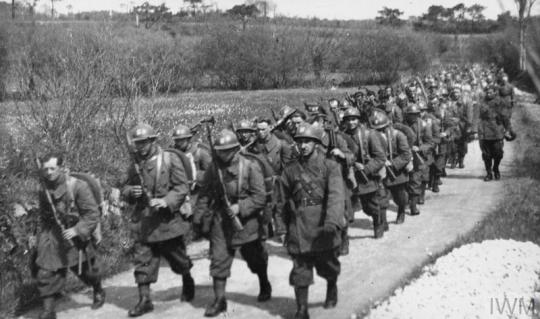
View On WordPress
#attack on Poland#Fall of Poland#German Invasion#German-Soviet Alliance#Invasion of Poland#Poland#Soviet Invasion
0 notes
Text
Meanwhile, Polish farmers continue to block the Ukrainian border. While Polish government, authorities and society as a whole does absolutely nothing about it, so i guess they're all fine with it.

Does Poland really want to share the border with russia, after all? Miss being a russian colony no matter what?
Poland has provided a lot of help to Ukraine, which is important and matters a lot, but now it looks like they really are trying to revert it as much as possible.
229 notes
·
View notes
Text
The world is fucked up
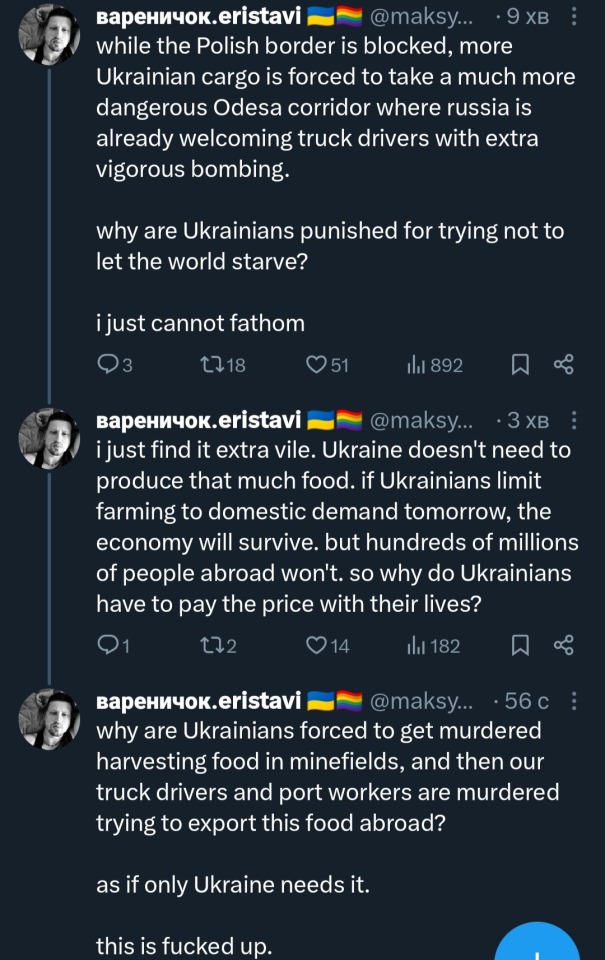
I don't get it either. Why my people must die when Russia has so much support? Because on its own there's no way Russians have numerous drones (Iran) and ballistic missiles which they shelled Odesa today. Where is justice? Make Russia pay! Please keep spreading our voices and donate to our army and combat medics (savelife.in.ua, prytulafoundation.org, Serhii Sternenko, hospitallers.life, ptahy.vidchui.org and u24.gov.ua).
#ukraine#russia#arm ukraine#stand with ukraine#genocide#stop the genocide#український tumblr#russo ukrainian war#russia is a terrorist state#thought#thoughts#war is real#reality shifting#literally#this is so real#reality#politics#united states#poland#germany#france#europe#eastern europe#war in ukraine#ukranian#support ukraine#odesa#russian invasion of ukraine#russian colonialism#russian imperialism
169 notes
·
View notes
Text
In another news, Polish farmers are now blocking all roads in the country. Ukraine's main infrastructure for delivering arms and aid - roads and railways through Poland - are blocked constantly, while Russians have finished their rail road from Russia to Donbas and have free run of all the roads on that side, of course🙃
Meanwhile, research shows that Ukrainian grain almost doesn't influence Polish grain prises (1st screenshot)
Also, when talking about someone taking advantages of their benefactors, Poland maybe wants to look in the mirror? (2nd screenshot - I bet Ukraine would be closer to the blue sector, if we were a EU member😉 )
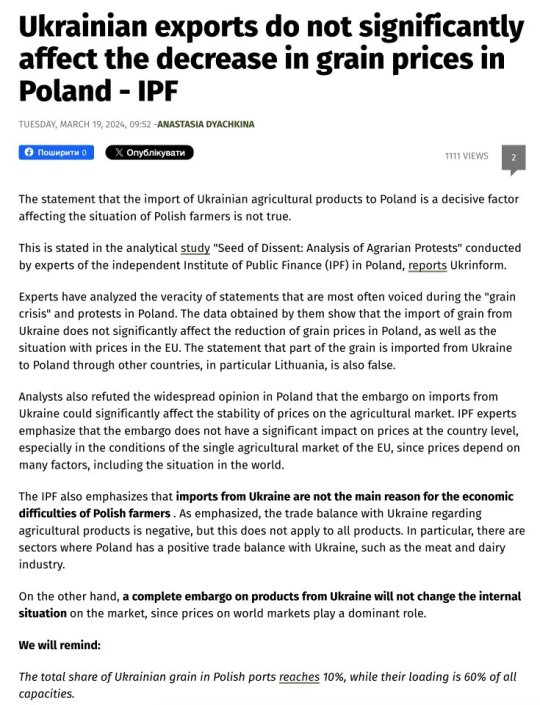

#ukraine#poland#russian invasion#україна#укртумбочка#укртамблер#укртумба#russian invasion of ukraine
165 notes
·
View notes
Text
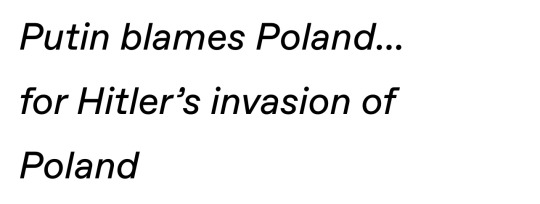
For someone who supposedly wants to “denazify”Ukraine, Putin sure does a lot of Hitler apologia.
This isn't the first time Vladimir Putin has been repeating this Nazi propaganda that Poland somehow forced Hitler to invade other countries. Putin has been regurgitating this same old Nazi rhetoric for years, but thanks to one of history's biggest useful idiots, Tucker Carlson, an untold number of tankies + other assorted ignoramuses will believe Putin’s revisionist Hitler apologia.
SN: Strangely enough, Benjamin Netanyahu also engages in the same Holocaust revisionism and Nazi apologia
Anyway, if you’re still dumb + gullible enough to believe that Putin invaded Ukraine to denazify it, or because of NATO, then please send me your full name, phone number, email address, home address, birthdate, ssn, credit card numbers and all of your bank details and social media passwords. I just want to help you out with something. Believe me. The same way you believe Putin :)
👉🏿 https://www.dispropaganda.com/single-post/2020/06/20/putin-blames-poland-for-the-invasion-of-poland
#politics#tucker carlson#ukraine#russia#poland#vladimir putin#republicans#tankies#nato#russian invasion of ukraine#nafo#whitewashing history#revisionist history#hitler apologia#white supremacy#holocaust revisionism#nazi apologia#russian imperialism#russian colonialism#putin apologists#russia is a terrorist state#vladimir putin is a war criminal#🇺🇦
173 notes
·
View notes
Text
the fact that Germany attacked Poland in 1939 under the pretext that Poland was persecuting Germans living in Poland and now Russia is attacking Ukraine under the pretext that Ukrainians are persecuting Russians in Ukraine is simply terrifying. The brainwashed Russians keep saying that they are defending themselves against Ukraine. It's really pathetic Nazi propaganda. The Russians have learned nothing from Germany's Nazi history. Every aggressor says it's a defensive war. Finally learn it, citizens of Russia, and leave your neighbor's territory.
but also when you tell the Russians to stop attacking Ukraine, they say, but America causes wars too!!
do you have to copy this thing from America too, you clowns?
#russian clowns#wwii#ww2#second world war#russian invasion of ukraine#stand with ukraine#poland#ukrainian#ukraine#world war 2#russia is a terrorist state#russian invasion#help ukraine#russian war crimes#russian terrorism#support ukraine#russian imperialism#russian propaganda#kyiv#stop terrorism
152 notes
·
View notes
Text
Poland's Scouts and Guides were branded as criminals by the Nazi Party, but carried on as a clandestine organisation, nicknamed the Szare Szeregi (Grey Ranks), operating with the Polish underground. They worked in children's homes, as nuses, provided bandages made from old linen, and gave out food and drink at railway stations. They acted as guards stationed in towers, listening out for enemy bombers. Trained to recognise different types of aeroplanes by the sound of their engines, when they heard a raid approaching they would radio the report centres.
One Guide company set up a first-aid station in a school; each classroom was looked after by one patrol, the Guides working in three-hour shifts. The girls helped to organise over fifteen auxiliary hospitals, several of which were destroyed by bombs and had to be evacuated repeatedly, as well as refugee shelters in schools, cinemas, offices and centres for lost children. During one air raid in Warsaw the Guides rushed into a collapsing hospital ward, picked up the patients and carried them on their backs to the cellar.
Guides stationed on the roofs of Warsaw shovelled off incendiary bombs while others in the streets below put them out with sand. As the siege closed in on the doomed city, Guides from farms in the neighbouring countryside made their way throught enemy lines with potatoes, eggs and any other food that could be found. One group of Rangers made a home among the ruins for orphaned toddlers. Some were severely wounded, and were too young to know their own names. As hundreds starved all around them, the Rangers took care of these children throughout the German occupation.
One of the most dangerous tasks undertaken by Poland's Guides was delivering food to the front line. “We pulled trolleys filled with bread over a one-kilometre bridge on the Vistula river to get to the kitchen at the railway station. The air-raid siren would sound in the middle of the bridge, and then we had to run,” remembered a Guider from Torun.
— How the Girl Guides Won the War (Janie Hampton)
#book quotes#janie hampton#how the girl guides won the war#history#military history#medicine#nursing#food and drink#girl guides#girl scouts#ww2#invasion of poland#siege of warsaw#poland#warsaw
4 notes
·
View notes
Text
Renia Spiegel- The diary of a teenage girl, murdered by the Nazis
Renia Spiegel- The diary of a teenage girl, murdered by the Nazis
Renia Spiegel was born on 18 June 1924 in Uhryńkowce, then in Poland and now in western Ukraine, to Polish-Jewish parents Bernard Spiegel and Róża Maria Leszczyńska.
Like many other teenage girls Renia kept a diary. She started hers when she was 15, on January 1st 1939, 9 months before German and Slovak troops invaded Poland.
Renia Spiegel had just turned 18 when the Nazis found her in hiding…

View On WordPress
0 notes